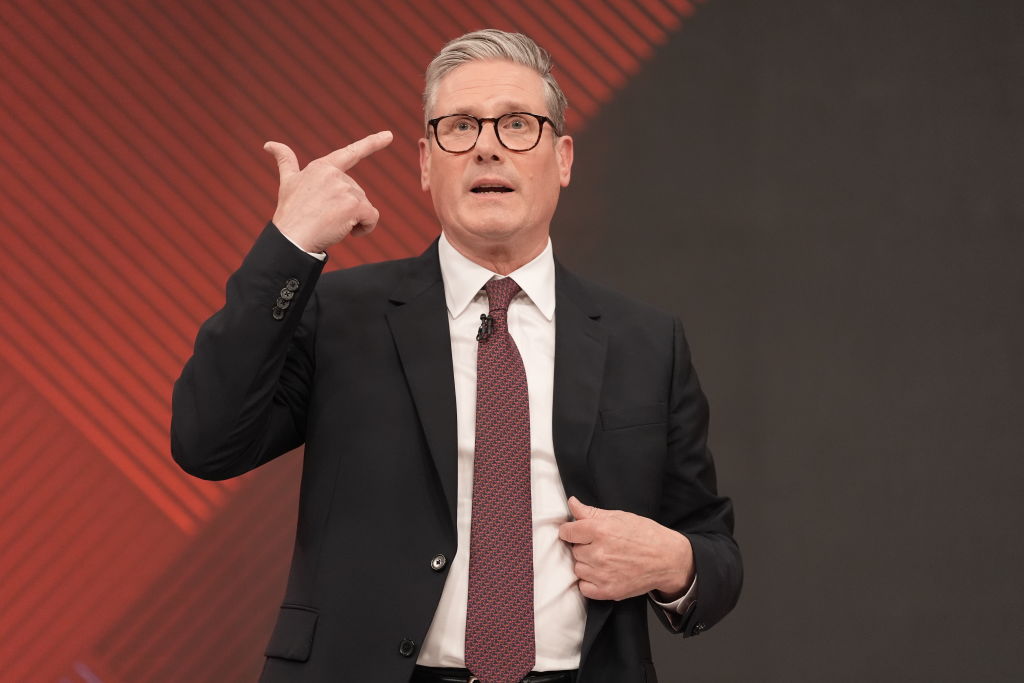Keir Starmer’s middling performance in last night’s debate against Rishi Sunak has done little to quell talk of a coming “supermajority”. According to some forecasts, the Parliamentary Labour Party (PLP) will have so many seats that it will actually spill out from the Government benches and overflow.
However they arrange themselves, the result will look strange and unnatural. The Palace of Westminster itself will seem to be revolting against it. To some this will be fitting. As we’re often told, the United Kingdom is a country of evolution not revolution, and has a political culture that is keenly adversarial. Parliamentary majorities of this size, then, are aberrant, un-British, and — according to the Conservatives’ latest campaigning literature — constitutionally suspect.
Surely, the natural balance will eventually reassert itself. A sprawling majority will be hard for Starmer to control. Without the discipline that an opposition instils, boredom and loopiness will set in, factional hatreds will reappear, and we’ll soon be back to the old political see-saw.
Don’t be so sure. Such will be Starmer’s freak preponderance over the House of Commons that he can probably defy if not political, at least parliamentary gravity.
For one, the candidate selection process has produced a slate of true Starmerites. The tilt towards the local hero in Parliament will abruptly end: the archetypal new PLP member will be young, ambitious for office, an alumnus of the Oxford or Cambridge University Labour Clubs. With deep local majorities and their careers ahead of them, few will have any reason to make trouble.
This is genuinely unprecedented. Even the 1997 cohort of supposed placemen included John McDonnell alongside Gisela Stuart, the future chair of Vote Leave. This class of 2024 will be numerous enough to swamp what remains of the Corbynite Left, and the party’s soft Left besides. As a result, the first great test — Gaza — will be no test at all, and the leadership will be free to take whatever position it likes.
The leader’s inner circle will prove less tractable. This is a closed world in which success, even electoral success, seldom counts. In 2006, Tony Blair had just won an election in the face of a hugely unpopular foreign war, and the economy was moving at a good clip. This did not spare him from an endless series of Brownite frondes launched purely to enforce the terms of a personal agreement concluded between the two at an Islington restaurant 12 years previously.
Trouble for Starmer is likely to begin here, in the highest circles. Indeed, most of Labour’s controversies during the last four years have played out in these councils: strange thuds from behind the curtain.
What’s striking is how brazen these have been, even during these years of success. Peter Mandelson has criticised plans to tighten up workers’ protections, and has dismissed Gordon Brown and Sue Gray’s constitutional ideas as “half-baked” hobby horses. Brown, for his part, has referred to a planned overhaul of the executive as “Maoist”.
Starmer fired Angela Rayner in 2021 from her role as party chair. She is unlikely to have forgotten the slight. For her own part, Gray has set herself up against a svelte “boys’ club” in politics. This is not quite a creed yet, but it is a rhetorical pose — one that’s implicitly directed against people like Mandelson.
This is all partly the result of Starmer’s own approach to politics. Like many, the Labour leader believes that the real political nation can be found not so much in Parliament, but rather in elder statesmen, civil servants and public bodies, all of which seem to rise above the factions. No wonder, then, that he has kept the old grandees so close, and plans to give the Office for Budget Responsibility a virtual veto over fiscal policy.
There is no cabinet format or system of whips to discipline these people, so this approach does lend itself to a certain kind of warlordism: personalist feuds and scraps over turf. A Labour supermajority will prove remarkably enduring, but the political centre of gravity will have long moved elsewhere.










Join the discussion
Join like minded readers that support our journalism by becoming a paid subscriber
To join the discussion in the comments, become a paid subscriber.
Join like minded readers that support our journalism, read unlimited articles and enjoy other subscriber-only benefits.
Subscribe